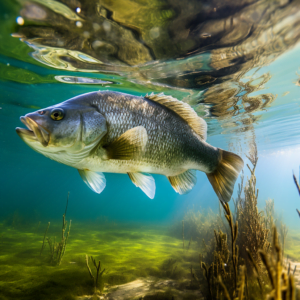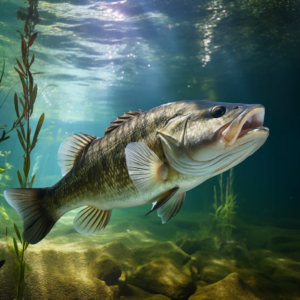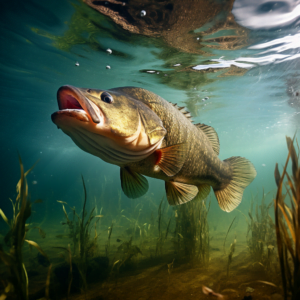Have you ever wondered if black bass is a good fish to eat? Well, you’re not alone. With its popularity among anglers, black bass has become a popular choice for many seafood lovers. But is it really worth trying? In this article, we will explore the nutritional value of black bass, its taste, and the potential health benefits or risks associated with consuming this fish. So, if you’re curious about whether black bass is a good addition to your diet, keep reading to find out more.
Black bass, which includes species like largemouth bass and smallmouth bass, is known for its firm texture and mild flavor. The taste of black bass can vary depending on its habitat and diet, but overall, it is often described as being similar to other freshwater fish like trout or perch. Many people find black bass to be quite delicious, especially when it is prepared fresh and cooked properly. In fact, it has become a favorite ingredient in various seafood dishes around the world. However, the decision on whether black bass is good to eat also depends on other factors such as nutritional content and potential health risks.
When it comes to nutrition, black bass is a good source of lean protein, omega-3 fatty acids, and vitamins such as B12 and D. These nutrients are essential for maintaining overall health and well-being. Additionally, black bass is low in calories and saturated fats, making it a healthier choice compared to some other types of fish. However, it is important to note that black bass can also accumulate mercury and other environmental contaminants, especially in certain areas. Therefore, it is crucial to consider the source and quality of the fish before consuming it regularly.
In conclusion, black bass can be a good fish to eat if you are looking for a healthy and flavorful addition to your diet. It offers a good amount of protein, omega-3 fatty acids, and essential vitamins, while also being low in calories and saturated fats. However, it is important to be mindful of potential contaminants such as mercury, especially if you are consuming black bass from certain areas. As with any food, it is always recommended to enjoy black bass in moderation and to consult with a healthcare provider for personalized dietary advice.
Introduction to black bass
Black bass is a popular freshwater fish that can be found in various parts of North America. It includes several species, such as largemouth bass, smallmouth bass, and spotted bass. Black bass is a highly sought-after game fish known for its strength and fighting ability, making it a favorite among anglers.
Nutritional value of black bass
Black bass is not only a tasty fish but also a nutritious one. It is rich in protein, which is essential for the growth and repair of tissues in your body. A 3-ounce serving of black bass provides about 21 grams of protein, making it an excellent source for meeting your protein needs.
Additionally, black bass is low in calories and fat, making it a healthy option for those looking to maintain or lose weight. A serving of black bass typically contains around 110 calories and 3 grams of fat, with most of the fat classified as healthy omega-3 fatty acids.
Health benefits of eating black bass
Eating black bass can offer numerous health benefits due to its high levels of omega-3 fatty acids. These healthy fats are known for their anti-inflammatory properties and have been linked to various health benefits, including improved heart health, reduced risk of chronic diseases, and enhanced brain function.
Omega-3 fatty acids have been shown to reduce inflammation and lower the risk of heart disease by improving blood lipid profiles and reducing the risk of blood clot formation. They also play a crucial role in brain development and function, and regular consumption of omega-3 fatty acids has been linked to a reduced risk of cognitive decline and mental disorders.
Potential risks of eating black bass
While black bass is generally safe to eat, there are certain factors to consider for specific populations, such as pregnant women and children. Black bass, like many other fish, may contain trace amounts of mercury, which can be harmful to the developing nervous systems of fetuses and young children.
It is recommended that pregnant women, nursing mothers, and young children limit their consumption of black bass and other fish known to contain higher levels of mercury. However, for most adults, the health benefits of consuming black bass outweigh the potential risks associated with mercury.
Taste and texture of black bass
Black bass has a mild and sweet flavor, with a firm and flaky texture. It has a delicate earthy taste that is not overly fishy, making it an appealing option for those who are not particularly fond of strong fish flavors. The flesh of black bass is white to off-white in color, and its texture holds up well in various cooking preparations.
Different culinary preparations of black bass
Black bass can be cooked in a variety of ways, allowing for versatility in the kitchen. It can be grilled, baked, pan-fried, or even used in soups and stews. The firm texture of black bass makes it suitable for grilling or broiling, as it holds its shape well.
For a simple preparation, you can season the fish with salt, pepper, and a squeeze of lemon juice before grilling it over medium heat until it is cooked through and flakes easily. Black bass can also be breaded and pan-fried for a crispy exterior and flaky interior.
Cooking tips and recipes for black bass
When cooking black bass, it is important to avoid overcooking, as this can result in a dry and rubbery texture. Aim for a medium cook, where the flesh is opaque and easily flakes when tested with a fork.
One popular recipe for black bass is to marinate it in a mixture of olive oil, garlic, lemon juice, and herbs such as thyme or parsley. Allow the fish to marinate for at least 30 minutes before grilling or baking it to enhance the flavors.
Another delicious option is to stuff the black bass with a mixture of breadcrumbs, chopped herbs, and garlic. Bake the fish until it is cooked through and the stuffing is golden brown.
Sustainability and fishing regulations for black bass
Sustainability is an important consideration when consuming fish, as overfishing can deplete the population and disrupt the ecosystem. Currently, black bass populations are generally stable, and several regulations are in place to ensure their sustainability.
Fishing regulations for black bass may vary depending on the region and species. It is important to be aware of the fishing regulations in your area and adhere to size limits and catch quotas to help preserve the fish population for future generations.
Alternatives to black bass
If black bass is not readily available in your area or you are looking for alternatives, there are several similar fish that can be substituted in recipes. Striped bass, walleye, and trout are some common alternatives that share similar taste and texture profiles with black bass.
Conclusion
Black bass is a nutritious and delicious fish option with numerous health benefits. It is low in calories and fat and contains high levels of omega-3 fatty acids, making it a heart-healthy choice. While certain populations should be cautious due to potential mercury content, black bass can be enjoyed as part of a balanced diet. With its mild flavor and versatile cooking possibilities, black bass is a great addition to any seafood lover’s menu. Just make sure to follow fishing regulations and consider sustainable fishing practices to ensure a future supply of this tasty fish.




